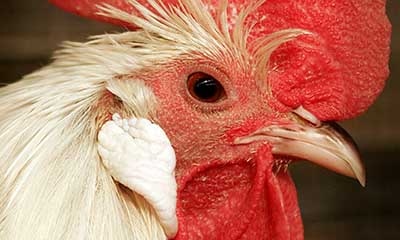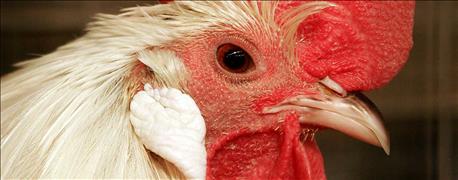
On Tuesday, 22 environmental groups and more than 50 Maryland General Assembly members launched the Poultry Litter Management Act. It was round two for legislation that would require poultry companies – namely, Perdue Farms, Tyson and others – to take responsibility for manure produced by their chickens.
Farmers would still be able to keep and use any manure for which they have a state approved plan. What’s different this time is that environmental community has more “ducks” in line and paddling in Annapolis.

BIG BIRD; BIG TARGET: Maryland environmentalists push legislation to make major poultry companies to be responsible for disposing of excess poultry litter.
“My constituents in Baltimore, like many Marylanders, are paying to reduce pollution from sewage plants and polluted storm water runoff. It’s only fair that big chicken companies be responsible for their waste,” said Senator Joan Carter Conway, chair of the Senate Education, Health and Environmental Affairs Committee. “I’m looking forward to this bill being heard in my committee.”
“This bill is about corporate accountability, and it’s about fairness,” added Senator Richard Madaleno, vice-chair of the Senate Budget and Taxation Committee. “Big chicken companies have the necessary resources and the responsibility to dispose of their own waste, just like other industries. Everyone must do their part to mitigate pollution into our state's iconic natural treasure."
Poultry companies own the 288 million broilers produced in Maryland each year, as well as the feed and most aspects of production. Yet, the companies aren’t required to dispose of the chicken litter. Instead, contracted poultry producers are required to do it at their own expense.
Advocates of the legislation contend that requiring corporations to take full responsibility for their wastes won’t put them at a competitive disadvantage, but will put them on a level playing field with other industries that dispose of their own waste. As written, the bill would require the poultry company to pick up only excess manure that the farmer doesn’t have the ability to use under a nutrient management plan or approved alternative use plan.
Supporters of the Poultry Litter Management Act include Food & Water Watch, Chesapeake Bay Foundation, Chesapeake Sustainable Business Council and the Maryland Clean Agriculture Coalition. That coalition includes Anacostia Riverkeeper, Assateague Coastal Trust, Audubon Naturalist Society, Blue Water Baltimore, Center for Progressive Reform, Chesapeake Climate Action Network, Clean Water Action, Environment Maryland, Environmental Integrity Project, Gunpowder Riverkeeper, League of Women Voters of Maryland, Lower Susquehanna Riverkeeper, Maryland League of Conservation Voters, Midshore Riverkeeper Conservancy, Potomac Riverkeeper, Sierra Club - Maryland Chapter, South River Federation, Waterkeepers Chesapeake, West/Rhode Riverkeeper.
~~~PAGE_BREAK_HERE~~~
Muddied facts
The groups fear that the litter disposal problem will grow on Eastern Shore Maryland since 200 new houses have been permitted for the Delmarva Peninsula. It must be noted, though, that many of those facilities are replacements for old houses.
They allege that agriculture is the single largest source of pollution to the Chesapeake Bay and Maryland waterways with about 44% of the nitrogen and 57% of the phosphorus polluting the Bay. They failed to report that Maryland and Delaware farmers have made significant progress in reducing both nutrient levels entering the Bay in recent years, and that Maryland has substantially upgraded its nutrient management regulations.
While agriculture contributes the largest amount of nutrients, population growth and related development have made storm water runoff the fastest growing source of Bay pollution, according to Maryland Ag Secretary Joe Bartenfelder. And with more than 400,000 acres planted in cover crops, Maryland agriculture already exceeds U.S. EPA’s 2017 Watershed Implementation Plan milestones for nitrogen and phosphorus by 18% – before the state’s enhanced Phosphorus Management Tool regulations went into effect last June.
Maryland’s Animal Waste Technology Fund is investing $2.5 million in grants for innovative technologies to manage or repurpose manure. Part of it is targeted to projects with a renewable energy component. Both target improved water quality plus a potential broader public value beyond agriculture.
About the Author(s)
You May Also Like




